Coconut Milk: Best and Worst Brands
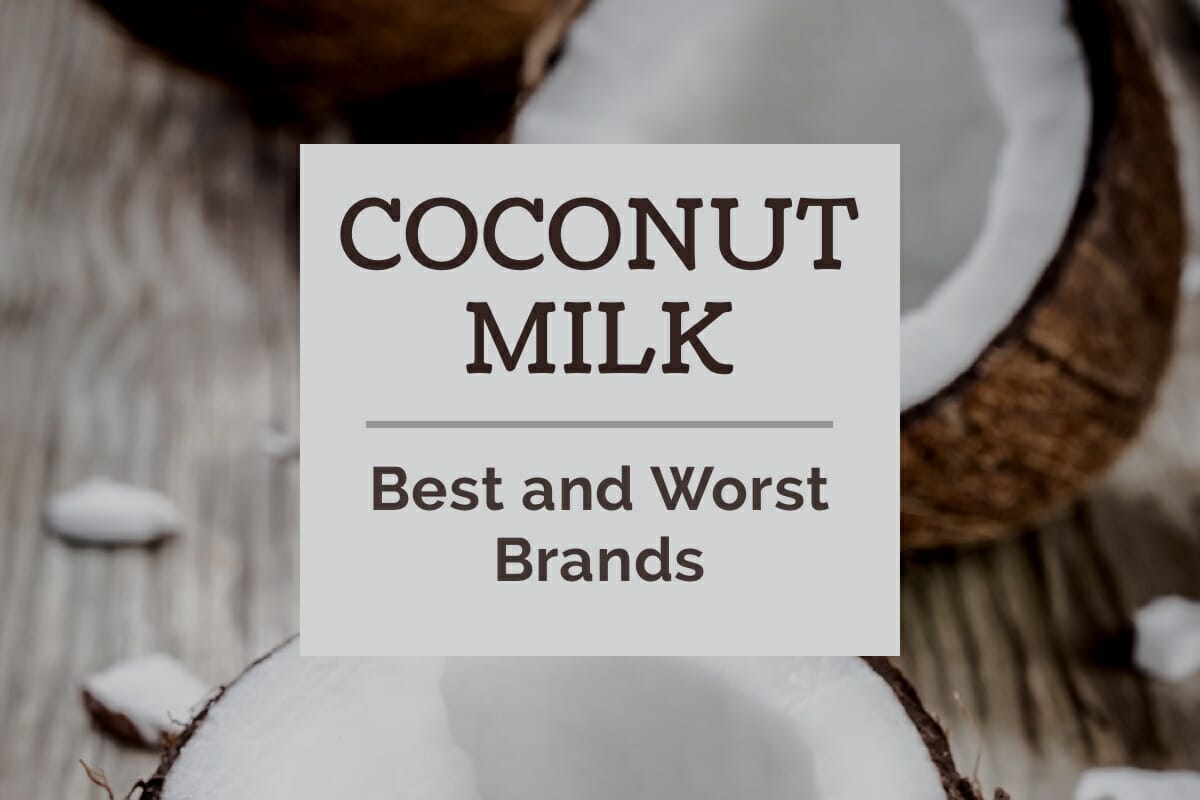
Coconut milk is a common ingredient in Asian cuisine.
In recent years it has become a popular ingredient in non-dairy beverage blends (in a similar vein to almond milk).
The difference between coconut milk and coconut cream
Both coconut milk and cream are a mix of coconut flesh and water. The difference lies in the ratios.
- Canned coconut milk – typically one part coconut flesh to two parts water. Consistency is thinner. Used for cooking.
- Canned coconut cream – typically four parts coconut flesh to one part water. Consistency is thicker and creamier. Used for cooking.
- Cartoned coconut milk beverage – very small amounts of coconut flesh to water. Fortified with vitamins. Used for drinking (as a cow’s milk alternative).
What are the best coconut milk beverages (cartons)?
Determining the healthiest is not easy. Coconut is itself high in fat, so the beverages are heavily diluted. Some are slightly sweetened, and others are fortified with vitamins.
The best coconut milk beverages
- So Delicious (unsweetened)
- Best on a budget: Silk (unsweetened)
Brands to avoid is Coconut Dream (uses carrageenan).
What are the best canned coconut milks?
These cans are BPA-free, and have simple ingredients without additives.
- Native Forest
- Natures Greatest
- Trader Joe’s
- Natural Value
Coconut milk cans to avoid
Both these brands use sulfites and are in BPA-lined cans.
- Chaokoh
- Goya
List of cartoned coconut milk beverages
Vita Coco Coconut Milk
Simple ingredients, no vitamin fortification. Lower proportion of coconut cream.
- Original has 50 calories, 5 g sugar, 3 g fat, 0 g protein per one-cup serving.
Ingredients (original): Organic coconut water from concentrate, organic coconut cream, gellan gum.
- Organic
Silk Unsweetened Coconut Milk
Silk is one of the most popular and the best variety to choose is the unsweetened.
- Unsweetened has 40 calories, 0 g sugar, 4 g fat, 0 g protein per one-cup serving.
- Original has 70 calories, 5 g sugar, 5 g fat, 0 g protein.
[Unsweet] Coconutmilk (Filtered Water, Coconut Cream), Vitamin and Mineral Blend (Calcium Carbonate, Vitamin E Acetate, Vitamin A Palmitate, Vitamin D2, Vitamin B12), Dipotassium Phosphate, Sea Salt, Sunflower Lecithin, Gellan Gum, Ascorbic Acid (To Protect Freshness), Natural Flavor.
So Delicious
The unsweetened is the best variety of the So Delicious brand of coconut milk.
- Unsweetened has 45 calories, 0 g sugar, 4.5 g fat, 0 g protein per one-cup serving.
- Original has 70 calories, 7 g sugar, 4.5 g fat, 0 g protein.
- Vanilla has 80 calories, 8 g sugar, 4.5 g fat, 0 g protein.
- Unsweetened vanilla has 50 calories, 0 g sugar, 4.5 g fat, 0 g protein.
[Unsweetened] Organic Coconutmilk (Filtered Water, Organic Coconut Cream), Contains 2% or Less of: Vitamin and Mineral Blend (Calcium Phosphate, Magnesium Phosphate, Calcium Carbonate, L-Selenomethionine [Selenium], Vitamin A Acetate, Vitamin D2, Zinc Oxide, Vitamin B12), Organic Sunflower Lecithin, Gellan Gum, Organic Locust Bean Gum, Sea Salt.
- Organic
Pacific Foods coconut milk
Uses a small amount of coconut water to improve flavor.
- Unsweetened has 45 calories, 0 g sugar, 4 g fat, 0 g protein per one-cup serving.
- Original has 60 calories, 3 g sugar, 4 g fat, 0 g protein.
- Unsweetened vanilla has 50 calories, 0 g sugar, 4 g fat, 0 g protein.
[Unsweetened] Water, Coconut Cream*, Contains 1% Or Less Of: Coconut Water Concentrate*, Gellan Gum, Guar Gum*, Natural Flavor, Sodium Citrate, Tricalcium Phosphate, Vitamin D2, Xanthan Gum.
- Organic
365 by Whole Foods Market
Uses a small amount of coconut water to improve flavor.
- Unsweetened has 50 calories, 0 g sugar, 5 g fat, 0 g protein per one-cup serving.
[Unsweetened] Organic Coconutmilk (Filtered Water, Organic Coconut Cream), Calcium Carbonate, Natural Flavor, Organic Locust Bean Gum, Gellan Gum, Sea Salt, Vitamin A Palmitate, Ergocalciferol (Vitamin D2), Cyanocobalamin (Vitamin B12)
- Organic
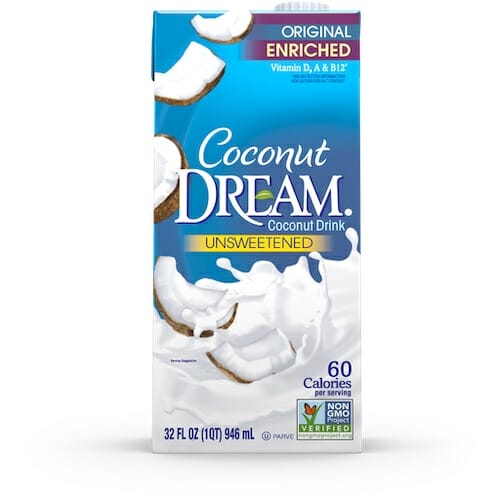
Coconut Dream
One of the few plant-based beverages to still use carageenan.
- Unsweetened has 60 calories, 0 g sugar, 5 g fat, 0 g protein per one-cup serving.
- Vanilla has 90 calories, 7 g sugar, 5 g fat, 0 g protein per one-cup serving.
[Unsweetened] Water, Coconut Cream, Tricalcium Phosphate, Carrageenan, Gellan Gum, Sea Salt, Natural Flavors, Vitamin D2, Vitamin A Palmitate, Vitamin B12.
Questionable ingredients in coconut milk beverages
Vitamin A Palmitate
This is a way to supplement vitamin A and is generally considered safe. People who consume a diet with plenty of fruit and vegetables will already be getting an adequate supply.
Vitamin A can build up in the body to toxic levels, but this is very rare and you’d be need to drinking a lot of the beverage.
Carrageenan
Carrageenan is a texturizing additive derived from seaweed that used to be in most plant-based beverages. Regarded as safe by the FDA, but some people reported gastro-intestinal issues.
Very few beverages contain this now – most using guar gum or gellan gum to assist with texture.
Canned Coconut Milk vs Cream vs Light
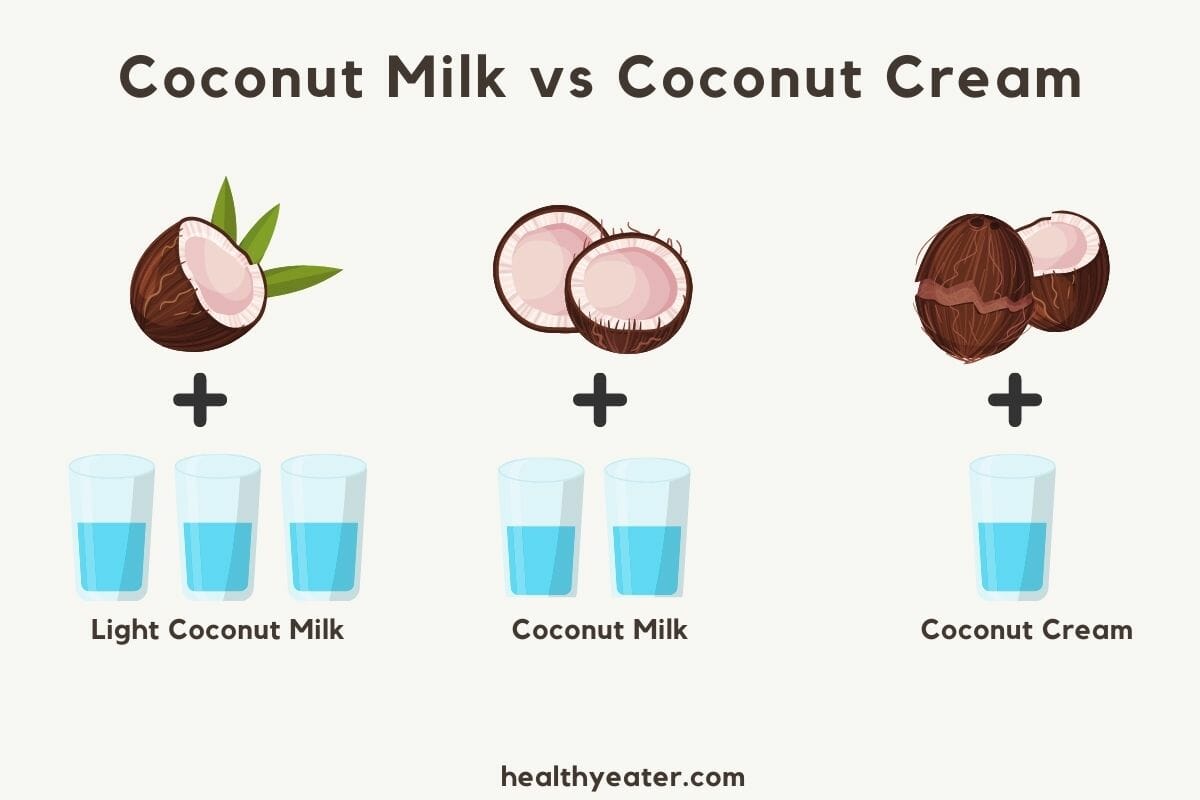
Coconut milk in cans is for cooking. There are typically three variations.
- Light / lite / reduced fat – Coconut is (by nature) a fatty food, so to appease consumers – there is a light version. It just means less coconut (typically half of normal milk) and more water. In many cases it may be uneconomic to buy.
- Milk – More coconut than light, less coconut that cream. Suitable for soups and curries – and cheaper than coconut cream.
- Cream – Lots more coconut – less water. More expensive, more suitable for desserts.
Tinned coconut milk isn’t usually fortified with vitamins – as it’s not made to mimic cow’s milk (like the carton beverages).
What about coconut water? This is a drinking beverage that is the high-potassium water that comes out of the coconut. No coconut meat has been shredded into it – so is not a ‘milk’.
List of Canned Coconut Milks
Canned coconut milk varieties abound and the most important thing to watch out for is BPA lined cans.
Bisphenol-A is absolutely a health concern. If you use half a can, make sure you put it into another container when refrigerating.
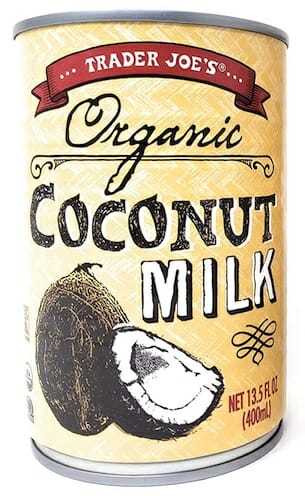
Trader Joe’s Canned Coconut Milk
- Reduced-Fat has 70 calories, 7 grams of fat, 1 gram of sugar, and 1 gram of protein in a 1/4 cup serving.
- Organic has 110 calories, 11 grams of fat, 1 gram of sugar, and 1 gram of protein per 1/4 cup serving.
- TJ’s Coconut Cream has 90 calories, 9 grams of fat, <1 gram of sugar, and 1 gram of protein per 2 tablespoons serving
Ingredients (organic): Water and Organic Coconut.
-
- USDA organic
- BPA-free
Nature’s Greatest
Organic range with just two ingredients.
Ingredients: Coconut extract and water.
- USDA organic
- BPA-free
- No guar gum
Native Forest Organic Simple
There is also Light and Classic (both of which contain Guar Gum).
- Light has per 1/4 cup serving has 45 calories, 4 grams of fat, <1 gram of sugar, and <1 gram of protein.
- Classic & Simple has per 1/3 cup serving has 140 calories, 15 grams of fat, 0 grams of sugar, and 1 gram of protein.
Ingredients: Organic Coconut Milk (organic coconut, purified water). BPA Free.
- USDA organic
- BPA-free
- No Guar gum (Simple and Turmeric version)
Natural Value
Despite the generic brand name, this is a good product.
- Lite has 60 calories, 5 grams of fat, 1 grams of sugar, 1 grams of protein per 1/3 cup serving.
- Regular has 150 calories, 15 grams of fat, 3 grams of sugar, 2 grams of protein per 1/3 cup serving.
Ingredients (regular): Organic coconut meat extract (53%), water (47%).
- USDA organic
- BPA free
Thai Kitchen (unsweetened)
- Lite has 50 calories, 4.5 grams of fat, 0 grams of sugar, and 0 grams of protein per 1/3 cup serving.
- Regular has 120 calories, 12 grams of fat, 1 gram of sugar and <1 gram of protein per 1/3 cup serving.
Ingredients (regular): Coconut, Water, Guar gum.
- Organic version available
Questionable ingredient(s)? BPA lined cans (Thai Kitchen do have a non-BPA resealable carton – but check availability).
Chaokoh Coconut Milk
This brand is not recommended because of the preservative used (sulfite).
Chaokoh has 150 calories, 14 grams of fat, < 1 gram of sugar and 2 grams of protein per 1/3 cup serving.
Ingredients: Coconut extract, water, citric acid, and sodium metabisulfite
Goya Coconut Milk
This brand is not recommended because of the preservative (sulfite) used.
Goya has 93 calories, 9 grams of fat, < 2 grams of sugar and 2 grams of protein per 2 fl oz serving.
Ingredients: Coconut extract, water, and sodium metabisulfite
Notable mentions
- Aroy-d coconut milk</strong – just coconut extract and water.
- Sungiven – coconut extract, water, and guar gum. BPA free.
- Roots circle – coconut extract, water, and xanthan gum. BPA free.
Is coconut milk the healthiest milk?
When comparing to plant-based beverages, coconut milk doesn’t offer too much, except it’s a little higher in fat.
Coconut fat does contain medium-chain triglycerides (MCTs) which is considered beneficial to heart health.
The beverage cartons (not the canned milk) contain extra vitamins and minerals.
How to know which coconut milk can is healthiest
There are many store brands of canned coconut milk, so use the following guidelines:
- Choose brands with no added sugar.
- Choose brands without carrageenan.
- Choose brands made with organic coconut when possible.
- Avoid brands with BPA lined cans.
- Avoid brands that use preservatives like sulfites.
- Be wary of vitamin A palmitate based on your total vitamin A intake.
Coconut milk can be a healthy cow’s milk alternative for people who don’t like almond milk, soy milk, or rice milk.
Also, coconut milk seems to do a better job of whitening coffee or tea than the others but with slight coconut flavor.
It’s also a great way to add flavor and good fats to recipes.
Useful Fact: Did you know that coconut milk is the only cow’s milk alternative that works great for use in cooked “Jello” type puddings?
The Best and Worst series:
- Dark Chocolate: The Best and Worst Brands
- Plant-Based (Meatless) Burger Brands
- Almond Milk Brands
- Rice Milk Brands
- Snack Bar Brands
- Kombucha Brands
171 Comments

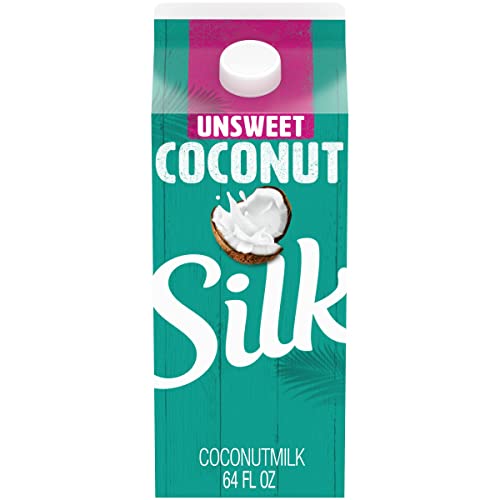



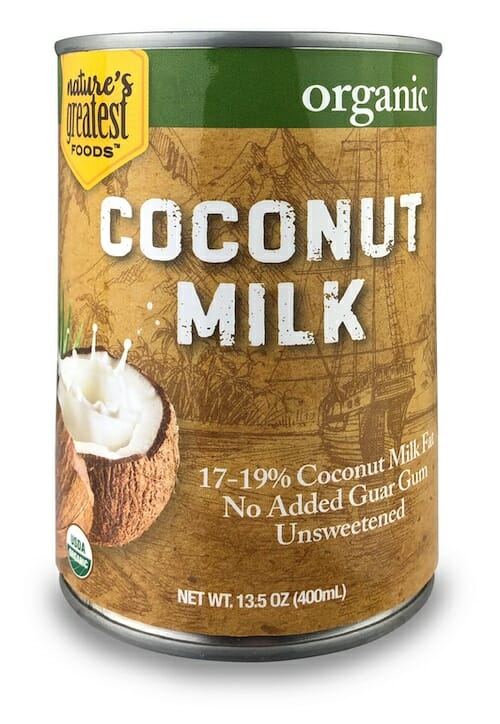
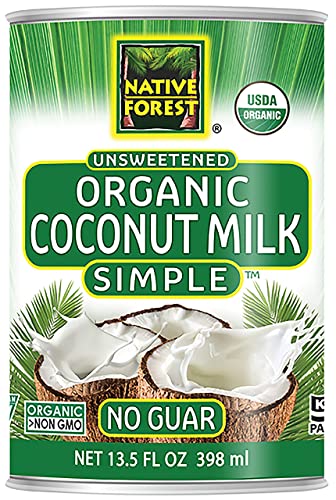
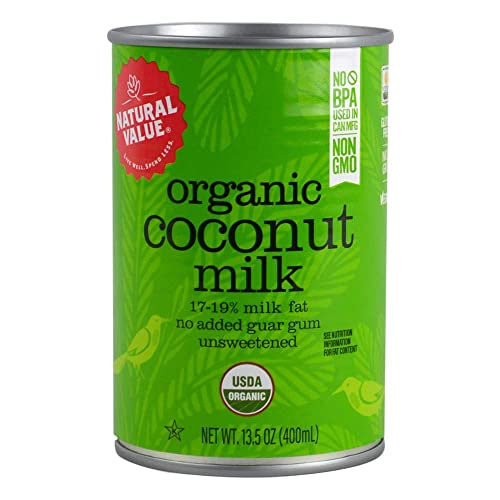

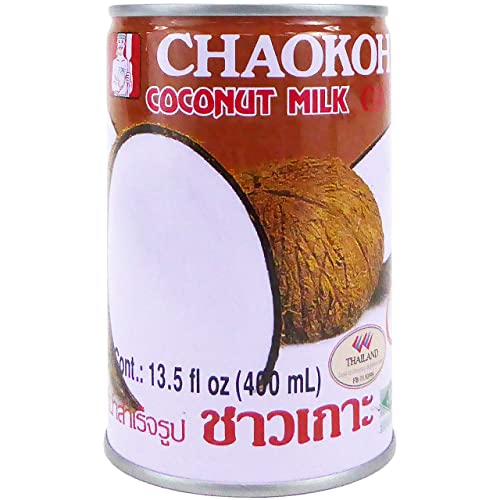
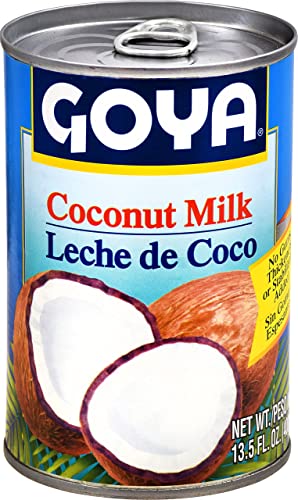

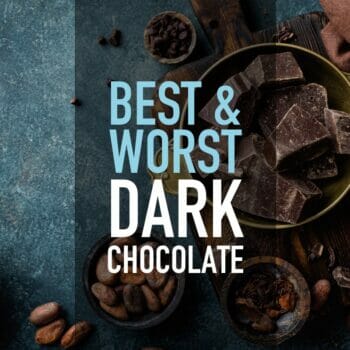 Dark Chocolate: The Best and Worst Brands
Dark Chocolate: The Best and Worst Brands The Best Plant-Based Burgers: Brands to Choose and Avoid
The Best Plant-Based Burgers: Brands to Choose and Avoid 18 Macro Friendly Desserts and Sweet Treats
18 Macro Friendly Desserts and Sweet Treats 10+ Delicious and Clever Ways to Eat More Vegetables
10+ Delicious and Clever Ways to Eat More Vegetables What Are The Best Snack Bars? Brands to Choose and Avoid
What Are The Best Snack Bars? Brands to Choose and Avoid
Chef’s Choice from Thailand. Got it at Asian store and is 99.997% coconut milk and water, 0.003% sodium meta sulfate. It is very rich, no need for sugars or sugar substitutes ( like corn fructose and cane sugar)) or all the various gums others have. Surprised no one mentions.
Trader joes has changed their canned coconut milk once again. It is says
organic coconut milk. It contains 48% coconut extract so iam thinking its fake. Is it?
Also what kind of coconut milk is Starbucks using now? And is it safe? I live in southern California. Thanks
It’s not fake, the rest will be water (and perhaps some other additives). As for Starbucks (I didn’t know they were using coconut milk?), you would have to ask at the outlet you go to.
If you’re looking for better, meaning more neutral flavor in coffee, tea or hot cocoa, use young coconut milk, it has less of the flavor coconut is known for.
Questionable ingredients?
Sea Salt, Natural Flavor, Sunflower Lecithin, Locust Bean Gum, Gellan Gum.
Do you even know what that “Natural Flavor” really is? I wager to guess, no. So do your readers a favor and don’t say it’s not questionable when it really is. There is a very specific reason why they don’t tell you what that flavor is and how it’s made, because it tastes, “natural” but it’s made in a laboratory.
So. Why is there is a lecithin in there? That’s an emulsifier but it serves another purpose, it acts as a flavor extender and a way to cheapen their actual amount of real coconut milk in the product. The various gums listed here are to make up for the inconsistency after the lecithin is added, they’re thickeners and again, extenders. These extenders and thickeners are a way for the manufacture to cheap out on you and make more money, all the while, some people can get sick from these “extenders and emulsifiers”. Let alone the “natural flavor” for which they are very reluctant to tell you what it is and how it’s made, let alone what was the original sources were.
I reiterate. What are questionable ingredients?
Anything that doesn’t come with the coconut water and meat, right out of the shell. Only difference between real coconut milk and cream is water, coconut cream is just cooked down coconut milk.
The safest coconut milk on your list is the
“Trader Joe’s Canned Coconut Milk”
Use Google to find out how to make your own coconut milk, it’s a learning process but you will be able to can it like you do with fruits and vegetables in Mason jars.
Just went out and bought the Silk brand after reading this webpage. When looking at the ingredients at the store I noticed something called carageenan (didn’t know what that was) but didn’t think anything of it as the Silk brand was listed #1 here. Just checked this page again to be sure and now I’m confused… Some help?
Thanks 🙂
Hi Lacy, I see your concern. In the USA it doesn’t contain carrageenan. https://silk.com/products/original-coconutmilk
It must be made differently for the Canadian market. Sorry for the confusion.
OK thanks for the clarification 🙂
Actually, this is incorrect. It depends on which date the product was created and which market sector it’s being sold at. Some of the northern states such as Minnesota, this does occasionally show up with “carrageenan” in it.
This is why I constantly read the labels because at any one time they may change without warning. Most supermarkets and even co-ops don’t even bother to check it until there has been a compliant lodged with them.
Carrageenan is a neuro-toxin. However, it’s extracted from an edible red seaweed (the concentration of it in the sea weed is far lower than what is used as a food additive).
It’s used as a thickener to give you an idea of what it’s used for. Works exceptionally well for oily / greasy substances.
My so delicious coconut milk has carageenan in it.
Which specific one are you looking at at. According to their website all of them are carrageenan free.
Hi I am new to all this. Which brand is lowest sugar
If you look above, you’ll see listings for unsweetened varieties. These would have the lowest amounts of sugar.
If you look at the list above there are several unsweetened varieties. These would have the lowest sugar amounts.
No carrageenan in Silk “milk” products anymore. Please update this outdated article.
http://www.huffingtonpost.com/2014/08/19/carrageenan-silk-beverages-whitewave-horizon-milk_n_5692501.html
Have you confirmed this on the label? The article says that in soy and coconut it would be phased out in the second quarter of 2015, while other products in 2016.
No problem. Silk has updated their ingredient list on their website now too.
Whoah! I got a shocker. Here’s the rub: Silk promised to change this. On their site the ingredient list doesn’t include carrageenan. I went to my local grocery store and looked at a container in person, with an expiration date in September, 2015, and it had carrageenan in the ingredients. Looks like Silk hasn’t switched it soon enough. Sorry for the confusion.
We’ve updated our details on the page here. But I suspect you are still to see the newer product on shelves.
This is exactly what I keep telling people, always and I do mean always read the ingredients list. For every product you get, even if it’s multiples in a box, take them out and read them.
That company has had one of those mix n’ match batches before. I’ve known people to get sick because they assumed that what they read on the outside box was correct. They weren’t doing their job in reading everything.
I love coconut milk n best brand for me is Silk Coconut Milk n I enjoy drinking it anytime of the day or night.
Aroy-D is a good choice.
http://www.amazon.com/Aroy-d-Coconut-Milk-100-Original/dp/B00JUB8N3G
yes, thanks for sharing!
That looks great. I just got one from the supermarket, I have not open it yet, it requires to be consumed within 2 days once I open the box. But I don’t know how to use up 33 fl oz in 2 days, so I have not used it yet. I’m thinking that I need to cook some coconut curry dish, and then make some coconut agar, then I’ll be able to consume 33 fl. oz in two days. Do you like Trader Joe’s coconut cream (in a can)?
Freeze it in ice cube trays
Hi. Can you recommend any brands in the UK?
I used to get coconut milk from CHI (http://www.planetorganic.com/images/products/large/20830.jpg)
A nutritionist told me it was one of the best brands out there another good brand is RAW Health. I used to get their coconut milk as well. I didn’t like their almond milk as it had a very sweet taste! I hope it helps.
Looks like a great choice! Thanks for sharing 🙂
I use the So Delicious coconut coffee creamers, along with the Soy. Not together, but I alternate between the two.
Soy isn’t good for you. I’d stick to coconut
Here is some evidence that soy is actually good for us. http://www.drfuhrman.com/library/debunking-anti-soy-myth.aspx Just don’t eat GMO soy or soy protein isolate. This states that there is much evidence that soy protects against breast and prostate cancer. And by the way, dairy naturally has a lot of estrogen, esp. when a cow is milked while they are pregnant, even if they are not injected with artificial hormones. This http://www.motherjones.com/media/2014/04/milk-hormones-cancer-pregnant-cows-estrogen states that dairy is correlated with INCREASED risk of breast and prostate cancer. Soy is beneficial and NOT harmful in moderation, esp. non processed, non GMO soy. Fermented soy is esp healthy.
I believe fermented food is not a safe food to eat-
I admire Dr. Mark Mincolla who has written books and has a radio show I listen to called “The Natural Health Show” on Sunday nights.
Almost ALL of these products have EXCITOTOXINS in them. That is far more dangerous than all of the things Talked about. Please lookup Dr. Russel Blaylock. People need to understand that in coconut milk the ONLY ingredient that should be in there is coconuts (and maybe water). Any company that adds anything else to it does NOT have your best interest in mind and will compromise your health to make a buck.
fermented foods are GREAT to eat!
and have a long history of human usage.
and fremented soy is the only healthy way to eat it, esp for women.